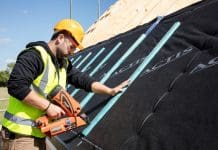Over half of consumers consider the environmental impact and energy efficiency of a property before renting or buying, British Land has found
More than half of UK adults (55%) think it is important to consider the environmental impact and energy efficiency of a property before renting or buying.
The research carried out by British Land, highlights how important sustainability is to people when deciding whether to rent or purchase a property.
Other findings indicate that sustainability is a priority with future generations
The findings come at a time when the energy price cap is set to hit £3,600 in 2022, but 25% of respondents were willing to pay a premium to live in a more energy efficient home.
Over a third (35%) of UK adults are either extremely or moderately concerned about their impact on the environment and living in an environmentally sustainable way (34%).
Nearly a quarter (23%) of 18–34-year-olds think it is very important to consider a property’s energy efficiency, compared to 18% of over 35s, demonstrating the increasing value of green issues amongst future generations.
Concerns about the energy efficiency of a property should be reflected in housebuilding
Over a third (35%) of UK adults are either extremely or moderately concerned about their impact on the environment, with a similar number of people concerned about living in an environmentally sustainable way (34%).
As people make more eco-conscious choices across the board, this suggests a willingness to pay more for sustainable purchases, including energy efficient homes.
A quarter of UK adults would pay a premium to live in a more energy efficient home, rising to 36% of 18-34-year-olds. Of those UK buyers who would pay a premium most would pay between 3-5% (43%).
The research found that 64% of people would consider moving to a new build home in the future but would pay particular attention to the construction process and materials used as part of their homebuying journey.
A home constructed with healthy (low chemical) materials would have some impact for 91% of people’s decision to purchase, while for one fifth (19%) of buyers it would have a big impact.
Purchasing a property where zero demolition or construction waste is sent to landfill would have some impact on 86% of people’s decision to purchase.
A new home with low or no carbon impact from construction would have some impact on a decision to purchase for 89% of buyers.
British Land’s Canada Water development embodies desired net zero goals
Matt Webster, head of environmental sustainability at British Land, comments: “This research shows that sustainability is increasingly front of mind for people – particularly younger generations – and it is starting to translate into bigger life decisions, including house purchases.
“The real challenge in the residential space is the operational performance of existing stock and making sure these are energy efficient. At Canada Water, we are in the privileged position of building new homes, with sustainability fully integrated both in the construction methods we are using and once the apartments are completed and someone’s home.”
Canada Water, British Land’s 53-acre development is set to deliver 3,000 new net zero homes, office space for an estimated 20,000 workers and up to one million sq. ft. of leisure, cultural and education facilities. The regeneration project will be a net-zero neighbourhood by 2030, achieved through materials innovation and a sustainability first approach to all elements of design and construction.
The regeneration project was the first in the UK to use cement-free concrete, ‘Earth Friendly Concrete’, in permanent works for its first phase plots, cutting embodied carbon by 45%, This material is now being explored across the masterplan.














